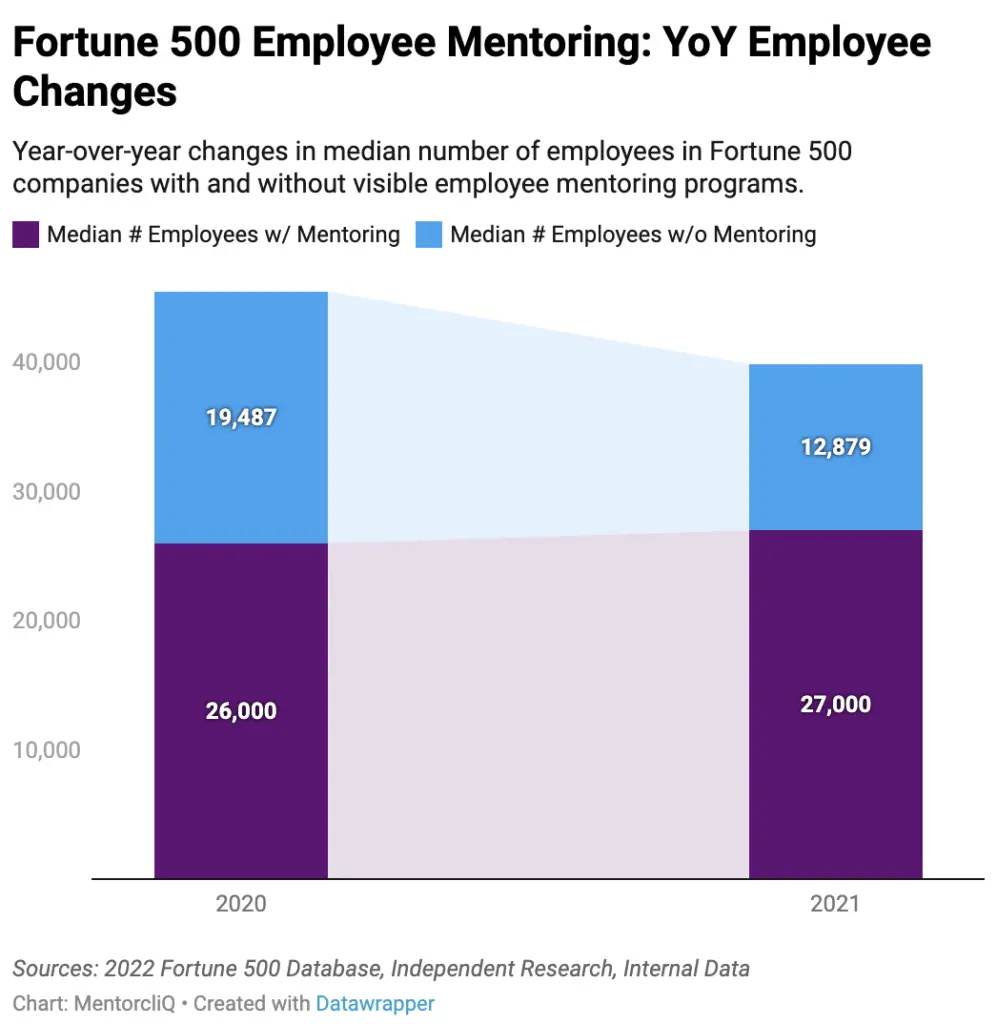When my wife worked at one of the Big 4 accounting firms in the early 2010s, she had a less-than-stellar experience with that company’s mentoring program. It wasn’t well run or well organized at the time, and as a result, she developed a strong distaste for structured mentorship as a concept. That speaks volumes to some of the skepticism that HR and talent development leaders we’ve worked with often face when trying to boost their participation rates. It’s hard to get buy-in when people either don’t know what to expect from a mentorship program, or judge the program you’ve created through the lens of past (bad) experiences.
If potential mentors and mentees have a negative association with mentoring, you’ll need put on your internal marketing. Tearing down those misconceptions will go a long way toward helping them get past that mental block. In doing so, you’re not just helping them succeed toward personal and professional development goals. You’re also securing the future of your program. And as we all know well, if your program participation rates are low, you probably won’t get executive approval to keep that program going after the first few cycles.
There are many facets to great mentoring programs. Creating better matches, for example, results in significantly better participant feedback scores, better program engagement, and vastly better program outcomes. (You can see how and why that is first-hand with a quick demo of the software.) But if you can’t get people to even sign up, that’s a moot point. So, a little marketing is in order. Building buy-in for mentoring starts with helping participants better understand what they can expect from the program, and then making sure you effectively deliver after you’ve set those expectations.
Think of and use this post as a guide for the top questions you should be able to answer for anyone who is on the fence about mentoring. That includes executive leaders who hold the purse strings, as well as potential participants (mentors and mentees).
What Is a Mentorship Program?
A mentorship program is an arrangement where a mentor, usually with more experience or expertise, facilitates knowledge transfer to the mentee.
Mentorship programs typically follow a structured framework where a seasoned industry veteran takes a less experienced individual (such as a junior employee or a newcomer to the industry) under their wing to them more quickly navigate their development of leadership skills, functional knowledge and insights, and career advice.
There are several different formats that work within the mentoring framework. Commonly, you’ll find that mentoring exists within one of the following categories:
- One-to-one mentoring: The traditional mentoring style that encompasses many different use cases or scenarios. Peer mentoring can also fall within this section.
- Group mentoring: A mentoring format where a small number of mentors work with a larger number of mentees. There’s no standard number here; it could be 1-to-5 or 2-to-7. I generally just requires a higher mentee-to-mentor ratio, with accommodations made in how the mentoring relationship is structured to accommodate for that.
- Mentoring Circles: Typically a peer mentoring format where multiple 3 or more individuals collaborate. Typically, the circle members take turns facilitating conversation.
- Reverse mentoring: While still within the one-to-one structure, reverse mentoring flips the script. A junior-level employee takes the lead as the mentor to a senior-level team member (usually Director or above). The focus of these mentoring relationships covers the gamut from emerging tech skills to improving understanding of DEI.
- Employee Resource Groups (ERGs): ERGs are nearly ubiquitous at enterprise companies. They provide affinity-based collaboration that often results in deeper-level engagement between participants.
In most mentoring relationships, mentors provide the roadmap to success that aligns with the mentee’s goals for career development. Mentors provide guidance, build a support system, and share lessons that allow mentees to prepare for what’s ahead in their career path.
It’s important to note that a successful mentor-mentee relationship offers benefits beyond the scope of career development. It can also facilitate personal growth for mentees, made possible by effective mentors.
3 Steps to Setting Mentorship Program Expectations
Setting reasonable expectations sets the stage for the success of any mentorship program, which is why we need to understand the purpose of mentoring from the start. Plus, defining the roles of mentors and mentees can spell the difference in the success (or the failure) of the mentoring relationship. These factors help all parties navigate the challenges that may arise during the mentorship.
1. Define the purpose of mentoring programs
The cornerstone of every successful mentoring relationship is clearly understanding its fundamental purpose.

For example:
- Is it to introduce new hires to the organizational culture (onboarding)?
- Is it to develop high-potential employees for managerial roles?
- Is it to help one with effective career pathing and development?
When the objectives are clearly identified, they form the basis of a strategic and collaborative relationship between the mentors and mentees. They also help the fence-sitters and skeptics better align mentoring with measurable outcomes.
Without this clarity, mentors, mentees and stakeholders might not be aligned in what they hope to achieve from the mentoring sessions or program as a whole. Even with an excellent mentor, the program won’t reach its full potential if the purpose isn’t clearly understood.
In general, mentoring relationships primarily aim to provide guidance and support systems for the mentees as they embark on their careers. Mentors’ wisdom, knowledge, and leadership skills can offer mentees valuable insights into their chosen fields.
By and large, though, mentors and mentees both benefit from program participation. Those participating in mentoring programs are:
- 2X as likely to be promoted
- Mentoring results in a 50% decrease (on average) for mentoring program participants versus non-participants
- Those with managerial experience show a 66% decrease in retention when engaged in mentoring programs compared to non-participants, while those without managerial experience show a 44% decrease in annual turnover.
The mentoring relationship not only facilitates knowledge transfer but also nurtures the essential skills mentees need to excel in their careers. Mentors also offer constructive feedback, fostering personal and professional growth. And both mentors and mentees increase their job and role satisfaction, resulting in higher productivity and greater employee retention.
Overall, this creates a safe environment where mentees can seek advice and cultivate skills that go beyond just the technicalities of their careers.
2. Understand the roles of mentors and mentees
The success of mentorship programs hinges on well-defined roles and responsibilities of both mentors and mentees. Understanding these roles is crucial for fostering and maintaining a harmonious relationship that mutually benefits each other.
Mentors
Mentors are individuals with more advanced knowledge or skills than the mentees. Their experience makes them instrumental in facilitating the mentees’ career development. Mentors should act as professional role models who offer guidance as needed and foster a supportive environment for mentees to achieve their desired personal and professional growth.
Mentees
Mentoring is a partnership, with mentees being as actively involved as mentors, ensuring it’s not a one-way learning process. Mentees should proactively seek knowledge and express their career goals and expectations, allowing mentors to customize their support. It’s also good for mentees to show commitment and receptiveness throughout the mentorship program to achieve their goals.
When both mentors’ and mentees’ roles are clearly defined, it enables purposeful and constructive interactions between them.
3. Recognize the benefits of mentorship

There is a misconception that only mentees benefit from a mentoring program. In reality, mentors can gain a lot from these mentoring sessions, too.
Mentees primarily benefit from mentorship by accessing the vast knowledge that mentors have garnered over the years. This knowledge transfer equips mentees with valuable insights into industry-specific challenges, enabling them to make informed decisions.
Mentorship also aids personal development and emphasizes the importance of social and soft skills in a competitive business environment. For example, mentoring can develop leadership skills crucial for career progression and impart needed soft skills like communication and problem-solving.
For mentors, the mentorship process is an opportunity to refine their leadership and communication skills, among others. Many mentors find fulfillment in sharing their insights with the next generation of industry professionals.
Key Expectations of a Mentorship Program: What Mentors Should Know and Do
Mentors and mentees will anticipate certain features, formats, styles, and structures to existing within the program. That’s not to say that everything participants expect should be a part of the program (although you will want to take that feedback into consideration). However, communicating what the program will have, and making sure it lines up as closely as possible to expectations, will get better and more consistent buy-in and participation.
One of the most crucial expectations revolves around the mentor’s role in the developmental journey of the mentee.
Provide guidance and direction
Mentors primarily guide mentees towards achieving their career objectives, offering insights during pivotal career decisions and helping navigate industry or role-specific challenges. An effective mentorship involves the mentee being candid about their strengths and weaknesses and seeking advice on improvements or skill acquisition to meet their career goals.
Most mentees will only be vulnerable when the mentor has created an environment conducive to both professional and psychological safety.
Personal development
While many seek mentorship for career progression, personal development remains a significant motivation. Constructive feedback from mentors can help mentees acquire essential skills for success. Achieving personal growth requires a strong relationship where both parties share experiences, and mentors provide insights. This emphasizes the importance of compatibility, active listening, and relevant advice in the mentor-mentee dynamic.
Expertise and knowledge sharing
Knowledge transfer is foundational in mentoring. Experienced mentors should willingly share best practices and lessons from their journey. This direct knowledge enables mentees to anticipate challenges, find solutions, and tap into resources, reducing the reliance on trial and error.
Skill development
Mentors should pinpoint and address areas for skill enhancement, ensuring that mentees are equipped with both technical and soft skills vital for their professional journey.
Industry insights
A lesser-discussed yet crucial benefit of mentorship is gaining industry insights. Mentees can expand their professional network and develop a deeper understanding of how their industry operates from an insider’s perspective. This immersion can provide a competitive edge in their respective fields.
Supportive and nurturing relationship
The foundation of successful mentorship lies in open communication, trust, and confidentiality. It’s not just about knowledge transfer; it’s about forging a bond based on trust, respect, and collaboration. Both parties should communicate freely, without judgment or hesitation.
What Mentees Can Expect From Mentors
The mentor’s role is pivotal in setting the tone for the relationship. As guiding figures, mentors are the compass that helps mentees navigate the intricacies of their professional journey.
- Availability: Mentors are expected to participate in mentoring sessions within the agreed schedule and duration.
- Facilitator: Mentors must challenge the mentee to learn, think, and seek growth to unlock their full potential.
- Advocacy: Mentors must provide support as the mentee pursues their professional and personal goals.
- Honesty: Mentees expect mentors to give constructive feedback openly and honestly.
- Role Model: Mentors should exemplify the field’s best practices and behaviors.
Those are just the basics, however. A well-structured mentoring program has clear guidelines in place for mentors and mentees to follow. Within mentoring relationships, mentoring agreements can help set the stage for a better relationship outcome.
What Mentors Can Expect From Mentees
Mentorship is as much about the mentee as it is about the mentor. Being the beneficiary of accumulated wisdom and insights, mentees need to bring a sense of purpose, respect, and willingness to the table.
- Respect: Mentees must respect the mentor for their time and commitment to participating in the mentoring sessions.
- Commitment: Mentees should also fully commit to the mentoring program by actively listening and engaging in each session.
- Responsibility: Mentees are responsible for their personal and professional development by being receptive to the guidance and support given by mentors.
- Honesty: Mentees must be open and honest in raising their concerns about the goals of mentoring.
- Proactive: Mentees should take the initiative in the mentoring sessions to focus on areas where they need the most help.
- Receptive: Mentees should listen to the career advice from mentors and show sincerity in applying it to their career journey.
- Follow Through: Mentees should solicit feedback from the mentor and take notes to improve the course of their career.
Bonus: What NOT to Expect From a Mentoring Program
While mentorship programs offer invaluable experiences and guidance, it’s important to have realistic expectations. Understanding what not to expect from mentorship can pave the way for a more productive and fulfilling relationship.
Instant results
While mentorship can indeed accelerate personal and professional development, expecting immediate results can lead to disappointment. Progress takes time, and the value of mentorship is often realized over extended periods.
Hand-holding
Mentors provide guidance, knowledge, and support, but they’re not there to do the work for their mentees. Fighting that temptation can be hard at times, but it’s important for mentees to learn by doing, within the guided framework that the mentoring relationship provides.
Mentees shouldn’t anticipate mentors to solve every challenge they face. Instead, they should expect guidance on how to approach these challenges.
A guaranteed job or promotion
Some mentees may mistakenly believe mentorship will directly result in job opportunities or promotions. While a mentor can provide valuable industry insights and networking opportunities, they’re not a guaranteed ticket to employment.
Sponsorship is often a positive outcome of mentoring relationships, but it should never been expected as a given outcome. There’s a clear distinction between mentorship and sponsorship, and it’s always on the mentor to decide if the mentee is ready for that type of advantageous benefit from being mentored.
A friendship
While many mentor-mentee relationships evolve into lasting friendships, it’s not a guaranteed outcome. Mentor matching software generally makes that mentor-mentee engagement feel as natural as a friendship, but again, neither the mentor nor the mentee should go into it with friendship as a demand or even as an expectation, especially if the mentoring engagement is in a professional setting.
The primary purpose of mentorship at work is professional growth, and it’s crucial to keep personal and professional boundaries.
Agreement on everything
Mentors and mentees come from different backgrounds, experiences, and perspectives. It’s natural to disagree at times. Productive disagreement can even be a valuable learning experience. It’s also critical for growth.
A mentor with all the answers
No one, no matter how experienced, has all the answers. It’s a good idea to approach the mentorship relationship with the understanding that mentors can provide guidance based on their experience, but they’re not omniscient.
A one-size-fits-all experience
Every mentorship relationship is unique. Just because a particular approach worked for one mentee doesn’t mean it will work for another. It’s essential to be adaptable and to tailor the mentorship experience to the individual needs and goals of each mentee.
Achieving a Successful Mentoring Relationship
A well-structured mentorship program can be a transformative tool for personal and professional development. When tailored to the objectives of both mentors and mentees, it can effectively guide both parties toward their career aspirations.
The key lies in setting clear and realistic expectations. Every individual involved should have a comprehensive understanding of their roles and responsibilities within the mentorship. And that’s when a mentorship relationship can truly flourish.
Recommended Next Steps
Launching and running mentoring programs isn’t easy, but it’s easily done when you take the right pathway to success. Here are some next-step items to help you succeed:
- Create a mentoring action plan
- Train your mentors
- Check out the software to see how it can improve your mentor-mentee matching strategy and produce better program ROI (the kind of results that executives LOVE)




